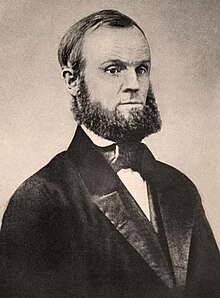John Humphrey Noyes
| John Humphrey Noyes | |
|---|---|
 |
|
| Born |
September 3, 1811 Brattleboro, Vermont |
| Died | April 13, 1886 (aged 74) Niagara Falls, Ontario |
| Education | Dartmouth College |
| Occupation | Utopian socialist |
| Known for | Oneida Community |
| Spouse(s) | Harriet Holton (m. 1838) |
| Children | Pierrepont Noyes |
John Humphrey Noyes (September 3, 1811 – April 13, 1886) was an American preacher, radical religious philosopher, and utopian socialist. He founded the Putney, Oneida, and Wallingford Communities, and is credited with coining the term "free love".
Noyes was born September 3, 1811 in Brattleboro, Vermont to John Noyes, who worked variously as a minister, teacher, businessman, and member of the U.S. House of Representatives, and the former Polly Hayes, aunt to Rutherford B. Hayes, 19th President of the U.S.
When he was 20, Noyes underwent a religious conversion, committing himself to the religious life. "My heart was fixed on the millennium, and I resolved to live or die for it," Noyes later recalled. He graduated from Dartmouth College shortly thereafter and dropped plans to study law, instead enrolling at Andover Theological Seminary with a view to entering the Christian ministry.
In the fall of 1832, Noyes left Andover to enter the Yale Theological Seminary so that he could devote more time to Bible study. In addition to attending daily lectures, practicing his preaching technique, and engaging in Biblical study, Noyes at this time began to dip his toe into political activism, helping to organize in New Haven one of the first Anti-Slavery Societies in the United States.
While in his second year at Yale Noyes made what he considered a major theological discovery. While attempting to determine the date of the second coming of Christ, Noyes became convinced that the event had already occurred. His conclusion was that Christ’s second coming had taken place in 70 AD and that therefore "mankind was now living in a new age."
With this in mind Noyes became increasingly concerned with salvation from sin and with perfection. He began to argue with his colleagues that unless man was truly free of sin, then Christianity was a lie, and that only those who were perfect and free of sin were true Christians. This internal religious crisis brought about a new religious conversion within Noyes, after which he began to proclaim that he "did not sin."
...
Wikipedia
